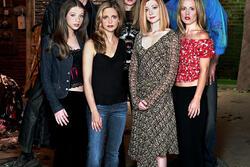In Willow's Defense
From my initial pre-teen viewing of Buffy the Vampire Slayer with my mom, to the countless times I have revisited the series since, I have always adored Willow Rosenberg, Buffy’s Jewish best friend who is lovable, dorky, and consistently overshadowed by the dramatic fight scenes, the messy romances, and everything having to do with Buffy Summers. That is, until the infamous sixth season when her witchy powers become her downfall.
If this season was a witch trial (which it was!), then I am retroactively acting as Willow’s defense attorney. It is my duty to protect and reclaim Willow’s narrative.
Jury, if you would please first refer to exhibit A: Season 3, Episode 16.
In this episode, “Doppelgangland,” Willow is alternately referred to as the “pinnacle of academic achievement” (as said by the cringey Principal Snyder), “old reliable” (as said by Buffy), and a “doormat person, homework gal” (as frustratingly said by Willow herself).
Willow is set up as the classic Sorcerer's Stone Hermione archetype. She’s a naive, innocent, nerdy, unpopular, not-taken-seriously young woman who falls by the wayside as the story privileges the emotional development of the mean popular girl, the hot angsty vampires, and the internal struggles of the titular character. Willow may be “old reliable,” but she’s pretty damn relatable.
I certainly identified with her as a young woman. Granted, I didn’t have my worldview turned upside down in 10th grade and, as far as I know, vampires don’t exist. But, I was fearful of, and worried about, almost everything, most of time. I lacked confidence, I enjoyed living life under the radar, and I found stability and comfort in the fact that I excelled at, and loved, school. As a pre-teen, I saw myself in Willow when she reacted with fear or anxiety rather than confidence.
Expressing her (very reasonable) fear doesn’t mean that Willow doesn’t also display an incredible amount of strength throughout the show, whether by defending the new girl, Buffy, when Cordelia gossips about her; consoling Xander when his over-eager sexual organs lead him down the road of near-death; or protecting Oz even when she discovers he’s the monster the Scooby Gang is after. Willow does what she believes is right, even when doing so is terrifying.
When people think of Willow, they often think exclusively of her tumultuous relationship with witchcraft. The everyday-ness of Willow’s heroism gets overlooked and unnoticed: she spends hours researching spells that then become integral to Buffy’s success, she endlessly works to please and support others, she loves discovering new things, and friendship motivates everything she does. All of these traits speak to Willow’s overarching goodness and strength. But Joss Whedon and Marti Noxon (both writers and executive producers of the sixth season of Buffy) did me dirty.
See exhibit B: Season 6.
Let’s recap: in Season 6, Willow resurrects a dead Buffy (who isn’t so happy about it), a trio of pervy nerds try to be the crime lords and supervillains of Sunnydale, Willow becomes a little too trigger-happy when it comes to her magic, one of the pervy nerds accidentally kills Tara (Willow’s girlfriend), Willow then absorbs all the dark magic in the world, kills him, and becomes the villain for the rest of the season. Whew!
All these years later, I’m still angry at the way the writers portray Willow’s relationship with witchcraft and her emotions.
To be fair, in an interview with Vulture, Noxon admits that the show may have gone too far. In her defense of the show’s treatment of Buffy, however, Noxon argues that there’s “a real catharsis in seeing women be the people with agency ... committed to the full range of emotions.”
I agree with part of this assessment: it is empowering to see women in charge who embrace their emotions. But Noxon isn’t talking about Willow here, she’s talking about Buffy. For the sake of further developing Buffy’s character, Willow is villainized and victimized. The complexity and agency that makes Buffy a hero makes Willow a villian.
Willow’s arc suggests that only one woman (Buffy) can be truly strong; any other woman armed with knowledge and power is a threat. It suggests that a woman is unable to survive and cope without a lover. That a woman can easily go mad and let her heart rule rather than her head.
I don’t want Willow to be remembered this way.
In light of the recent news that Buffy the Vampire Slayer will be getting a sequel and will likely feature an African-American vampire slayer (yay!), let us not forget about the “Willow” of the revisited series. This slayer will still need a best friend. Joss Whedon, you have a second chance here! Monica Owusu-Breen, I’m counting on you! Let’s give the next Willow a better, more nuanced treatment.
Now, obviously, I’m not condoning that part of the show when Willow flayed someone alive to avenge her dead girlfriend but … magic gave her the ability to seek justice (in a way that was bigger and quicker than just waiting for Buffy to get off her ass). Magic allowed Willow to be an active agent of change.
Like Willow, I have become an agent of change through my own form of “magic”––oral and personal histories. No, I can’t float a pencil or cast a protection charm, but I have the power to ensure women’s stories are heard for generations to come, that the integrity of their personal narrative is kept intact, and their history is given just as much volume as that of a man’s.
I listen to women’s stories about their lives, bearing witness to their power, their battles, their victories; I do right by elevating the voices of women who might otherwise go down in history as simply “old reliable,” or “doormat person, homework gal.” As mainstream history diminishes their accomplishments or files their stories under “special interest,” I stand in their defense. In terms of the Buffy sequel, I don’t want history to repeat itself and for another dorky, lovable, complex character to be forced into a one-dimensional portrayal.
By protecting and reclaiming the integrity of Willow’s narrative from the first episode to the last, I hope that people will realize that sometimes the most heroic actions are small acts of kindness. That it’s okay to be yourself, love what (and who) you love, and be proud of your abilities. Willow reminds us that we all have untapped powers and talents; we all have our own forms of magic.








Willow is by far my favorite character in the series. I love her intelligence, heart and loyalty. And I thought that comparing magic to drug addiction was a bit ridiculous.
And I felt that she was never allowed to be powerful in her relationships - even Tara got heavy-handed. I wish she could have had more of a magic mentor, I think almost anyone would have trouble with that.
I fear that there will not be another Buffy series, but I am content to watch the old ones over and over.
I disagree wholeheartedly with your analysis of Willow in the sixth season. She was still able to be strong, and while it did boil down to a Buffy vs Willow fight, I believe you’re looking at the wrong things. The beauty of Buffy was that it could take mundane everyday things and portray them compellingly on screen guised in the Supernatural. While it’s true Willow did snap after Tara’s death it wasn’t to show how fickle women are. Willow’s storyline in season 6 was a very clear parallel to something a lot of addicts go through. Her addiction to magic and her need for it, being helped by friends to stop the abuse of the magicks, secretly still using behind her friends back.
Evil!Willow was the personification of a relapse that could have very well killed Willow, it wasn’t something Buffy could fix with her fists. In the end it could only be fixed by Xander, her oldest friend, being there for her. It could only be stopped when she was ready to get help and face the problem head on.
Maybe it wasn’t something you had to deal with personally in your life so you couldn’t see it that way I do, but I’m someone who lost a cousin to an overdose and nearly a sister before she got clean.
Willow was far from 2 dimensional in season 6, and she was far from only being villainized to boost Buffy as a hero. She was a struggling addict trying to get better only to be pulled back into her habits by a devastating loss.
Willow was relatable to be throughout the entire series. I was the nerdy old reliable homework type, I also struggled with my sexuality before realizing I was gay, and I saw first-hand what drug addiction can do to a person.
It didn’t diminish Willow’s story, if anything it made her more human, more relatable, and was a damn compelling way to fit an addiction storyline into the supernatural aspect of the Buffyverse.
Great article. (Personally, I couldn’t get past the fact that when Willow was “evil”, her hair and eyes turned dark. There’s a name for that sort of thing, isn’t there?)
Can’t wait to hear what you have to say about the Jean Grey/Dark Phoenix Saga in Marvel‘s “X-Men” series.
Excellent conclusion! Very insightful.